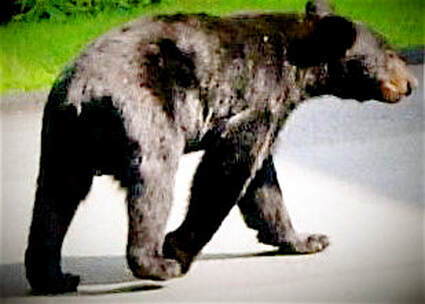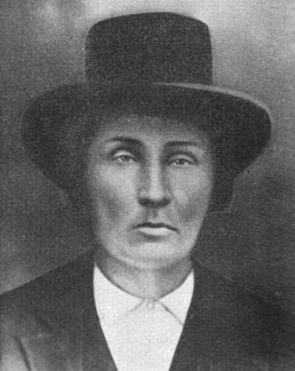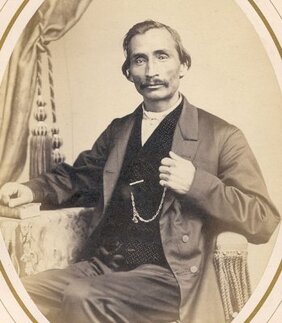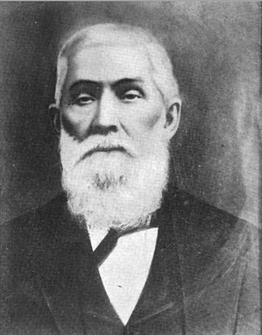|
(Photo courtesy of Wiki Commons - public domain photo)
This is the fourth in a series of blog posts offering brief information on every constitutionally-elected Principal Chief of the Cherokee Nation since 1828. Charles Thompson, or Utselata, was born sometime in the early 1800s in the Cherokee Nation East. While young, he attended the Baptist Mission School in Valley Town, now Andrews, North Carolina. He was heavily influenced by The Rev. Evan Jones and his son, John Buttrick Jones. Utsela’s family was forced to make the journey on the Trail of Tears and settled in what is now Delaware County, Oklahoma. Utsela joined the Keetoowah Society in 1859. He joined the 1st Regiment of the Cherokee Mounted Rifles during the Civil War on the Confederate side. In 1867, he was elected as a Delaware District senator to the Cherokee National Council. During this time period, he took the name Charles Thompson. While a senior senator in the Cherokee Senate, he was appointed to fill Chief Downing’s place during his dying days. On 1 August 1875, Thompson defeated William P. Ross in the election for Principal Chief, and served until 1879. Charles Thompson died 22 June 1891. He is buried in the old Indian cemetery Eucha, a town that was relocated in 1952. His grave, of course, was relocated at that time. ***Bryan D. Jackson’s new release, Chattahoochee Rain (ages 12 and up), is available for purchase for the holidays. It is a historical fiction account that paints a portrait of events during the months leading up to the Treaty of New Echota and features some of Bryan’s direct ancestors.
0 Comments
(Photo courtesy of Wiki Commons - public domain photo)
This is the third in a series of blog posts offering brief information on every constitutionally-elected Principal Chief of the Cherokee Nation since 1828. It is said that Lewis Downing was born sometime in 1823, in eastern Tennessee. He attended the Valley Town Mission school in North Carolina. He seemed to demonstrate evidence of being a spiritual person from a young age. At age 15, Downing, along with his family of origin, traveled the Trail of Tears in the attachment conducted by The Rev. Jesse Bushyhead. He is listed on the Drennen Roll of 1852, the census of new arrivals to Indian Territory from the East. Downing was ordained a Baptist minister in the new territory. The people of First Baptist Church in Adair County chose him as pastor following Rev. Bushyhead’s death. In 1845, he was elected as a Cherokee senator. He also served as a Cherokee tribal delegate to Washington, D.C. During the Civil War, Downing served as a chaplain to the 1st Cherokee Mounted Rifles regiment. On 1 August 1866, Downing was serving as Assistant Principal Chief when Chief John Ross died. He served by convention until October of that year. The council then appointed William P. Ross to fill the position until the next election. On 5 August 1867, Downing was elected Principal Chief and was re-elected in 1871. Lewis Downing died of pneumonia on 9 November 1872. He is buried in the Ned Adair cemetery in Mayes County, Oklahoma. ***Bryan D. Jackson’s new release, Chattahoochee Rain (ages 12 and up), is available for purchase for the holidays. It is a historical fiction account that paints a portrait of events during the months leading up to the Treaty of New Echota and features some of Bryan’s direct ancestors. (Photo courtesy of Wiki Commons - public domain photo)
This is the second in a series of blog posts offering brief information on every constitutionally-elected Principal Chief of the Cherokee Nation since 1828. Note** William P. Ross was elected twice by the Cherokee Council, not by the Cherokee people at large, but is nevertheless included in this list. William Potter Ross was born 28 August 1820 near Lookout Mountain, Tennessee. The nephew of Principal Chief John Ross, William Ross was well-educated and devoted to his uncle. He was enrolled in various mission schools of the day, educated at Princeton University and the College of New Jersey, and took on numerous roles of responsibility within the Cherokee Nation. Among these were his appointment to clerk of the Cherokee Senate and editor of the Cherokee Advocate. He wrote amendments to the Cherokee constitution and, while Chief, was respected as a speaker, writer, and statesman. When his uncle died in the summer of 1866, leaving the office of Principal Chief vacant, Ross was appointed to fill the position. Ross served as a lieutenant colonel during the Civil War, on the side of the Confederacy. He did little to speak out against slavery following the Emancipation Proclamation and, after Lewis Downing’s administration, was appointed yet again in 1872. During this time in office, Ross was viewed by many traditional Cherokees as supporting and encouraging European influence to take over the nation. His second known wife was his first cousin, Mary Jane Ross. William Ross died at Fort Gibson on 20 July 1891. He is buried in Citizens Cemetery, Fort Gibson, Oklahoma. ***Bryan D. Jackson’s new release, Chattahoochee Rain (ages 12 and up), is available for purchase for the holidays. It is a historical fiction account that paints a portrait of events during the months leading up to the Treaty of New Echota and features some of Bryan’s direct ancestors. |
Yona Ambles"YOH-nuh" (yonv) means "bear" in Cherokee. Thanks for visiting! Archives
January 2024
|




 RSS Feed
RSS Feed
